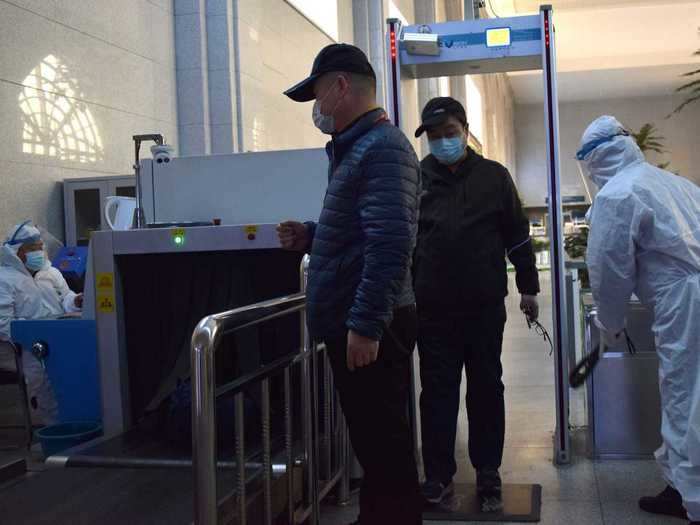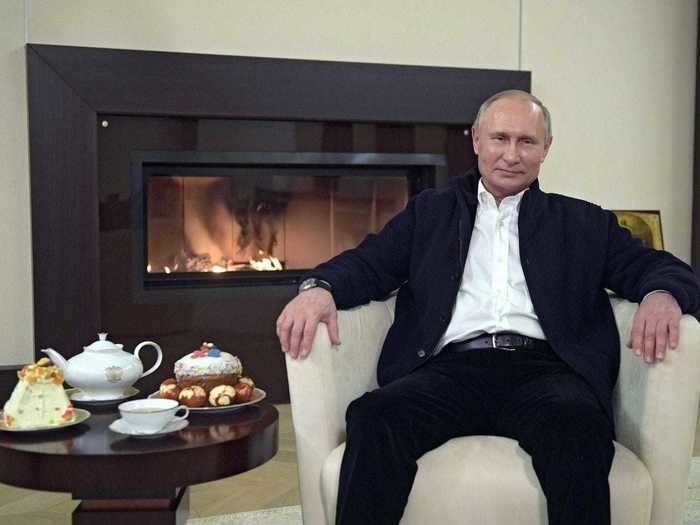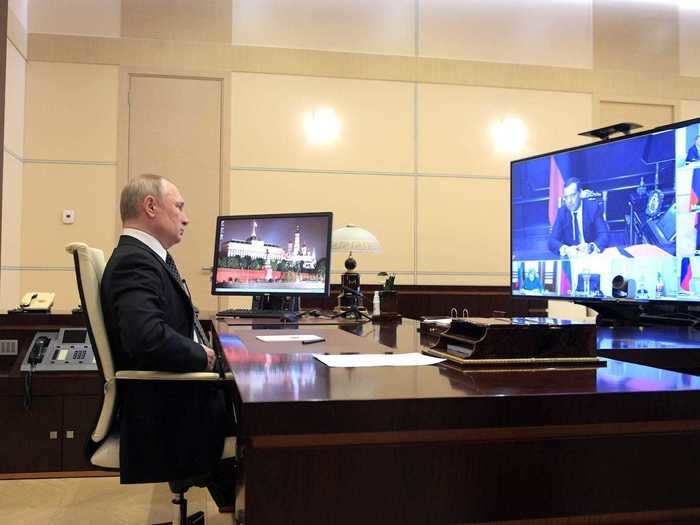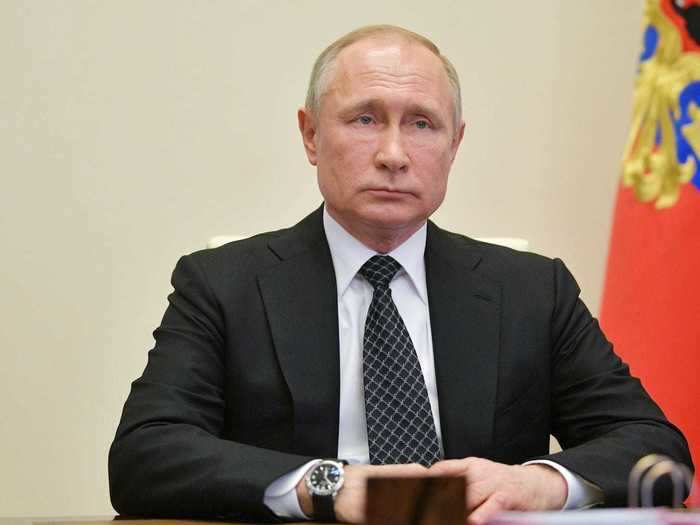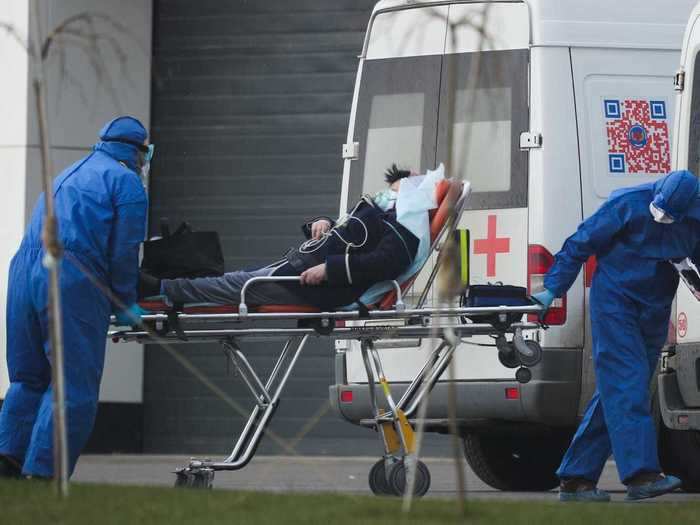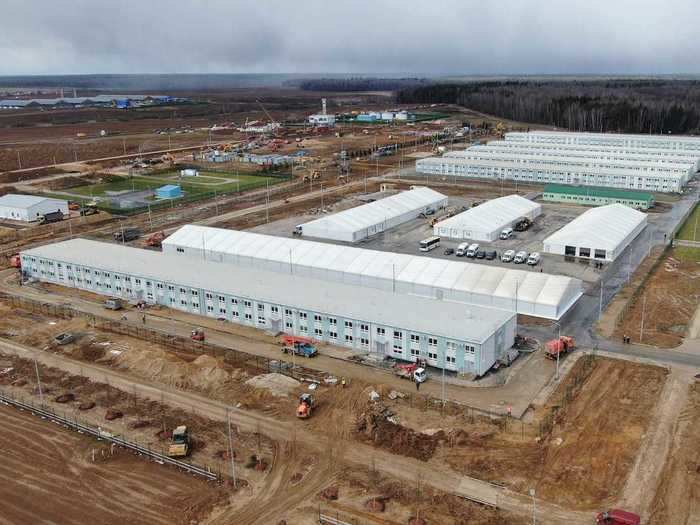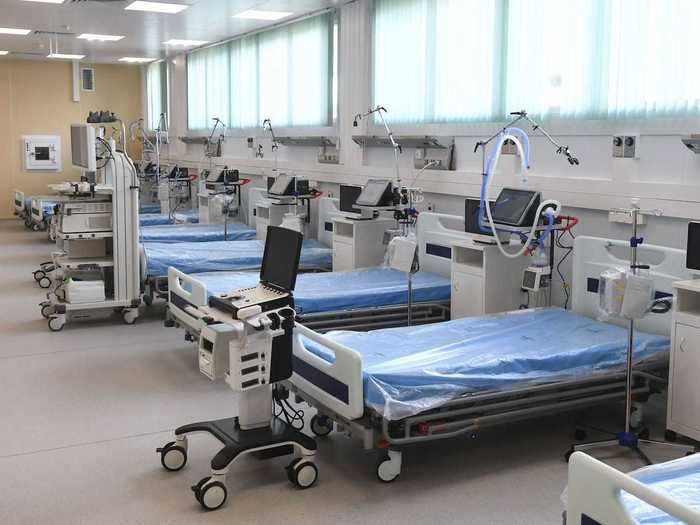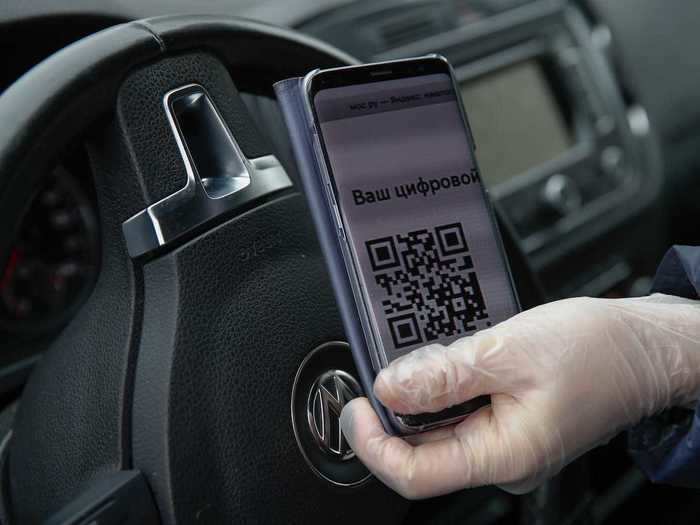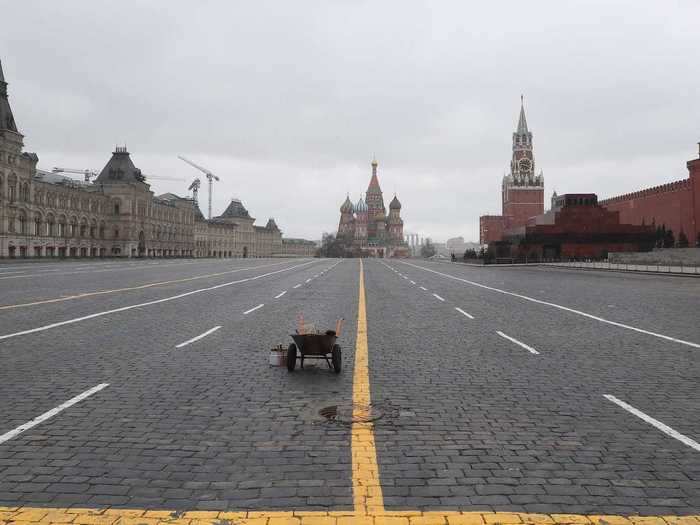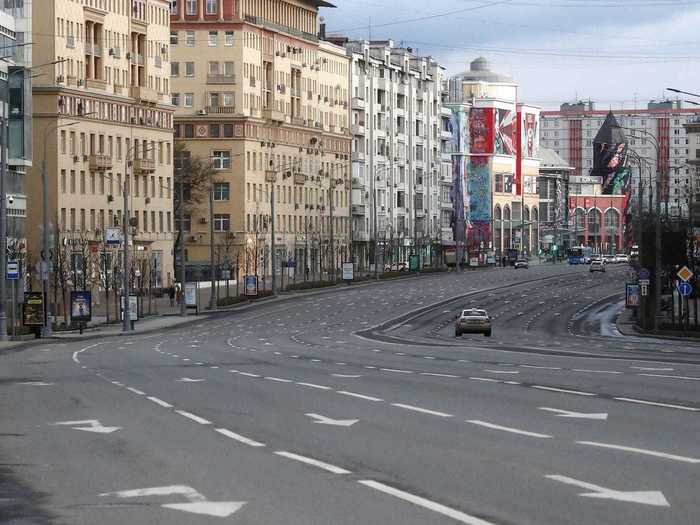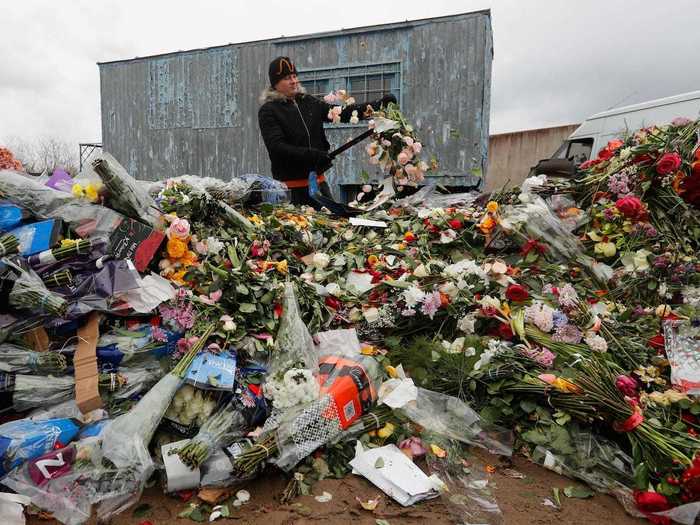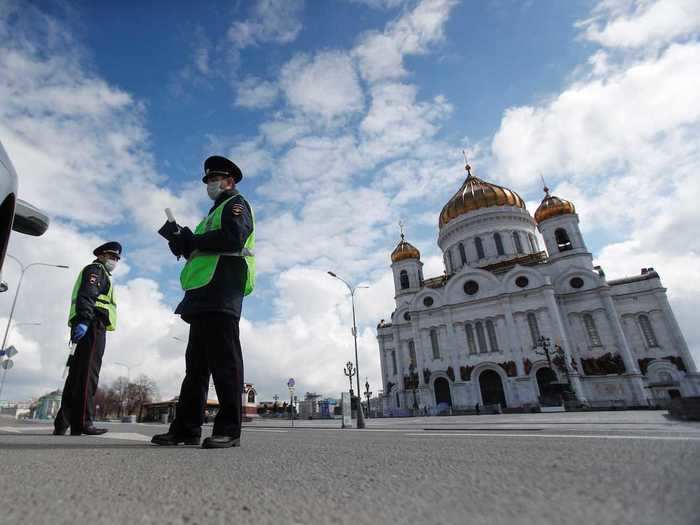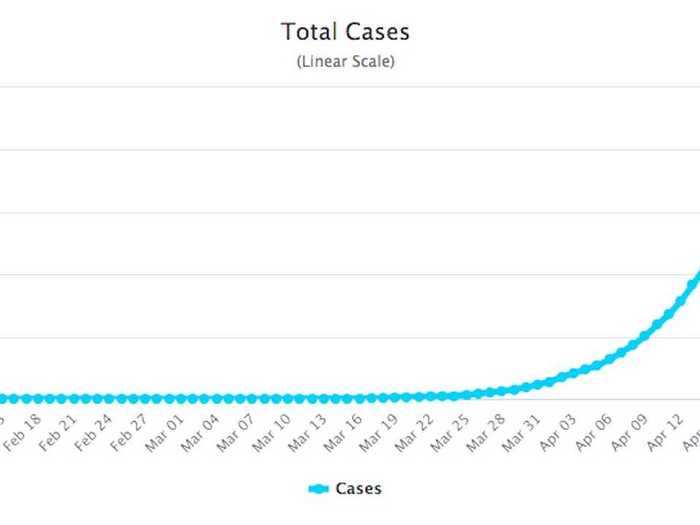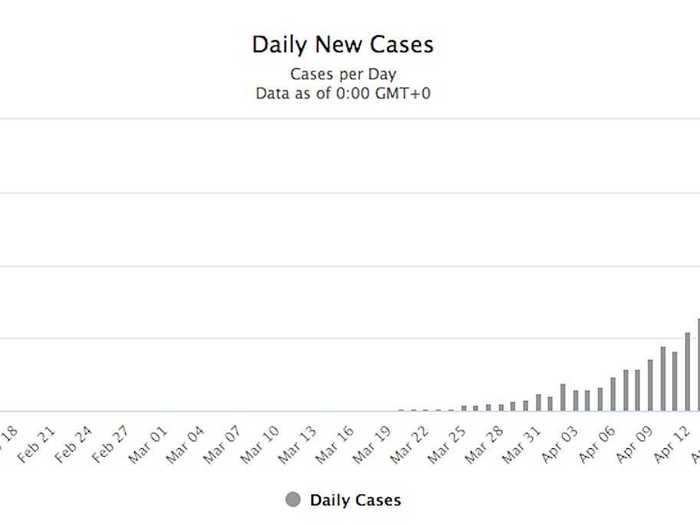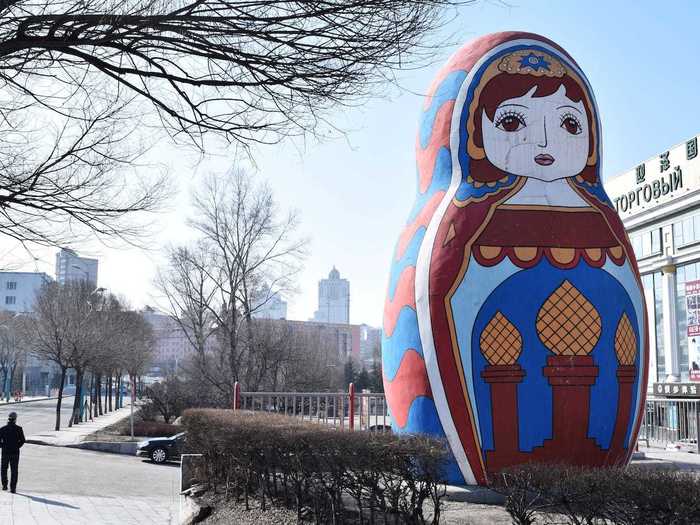Ruslan Nazarov, head of the Murmansk Region Branch of the Russian Emergency Situations Ministry, at a mobile field hospital in the village of Mezhdurechye on April 15, 2020.Lev Fedoseyev\TASS via Getty Images
- Russia has seen a surge in coronavirus cases in recent days.
- The country has made early efforts to stem the outbreak: in late January, it shut its border with China in an attempt to stop the virus entering.
- Major cities have also been locked down since March 30, with people allowed only to leave their homes to buy essential goods or for medical emergencies.
- But Russia still appears not to have stemmed the outbreak efficiently enough, with hospitals overflowing and doctors complaining about the lack of protective equipment.
- President Vladimir Putin, who has been largely absent from the front lines of the crisis, has also delivered mixed messages on the virus: On April 14 he said the country was having "a lot of problems," only to say five days later that everything was "under full control."
- Visit Business Insider's homepage for more stories.
While the US and some of Europe's hardest-hit countries were battling the coronavirus outbreak, Russia was still reporting low numbers of confirmed cases in comparison.
But the number of infections has surged in recent days, leaving President Vladimir Putin to admit that the country is facing an "extraordinary crisis."
Though the Russian government took measures early — it shut its border with China in late January — it has overseen a chaotic response to the crisis, largely due to mismanagement and a lack of communication.
Scroll down for an overview of the country's response.
Read the original article on
Business Insider
Meanwhile, hotspots have emerged in several other regions in the country, including the northeastern region of Komi, where officials reportedly lied about its coronavirus outbreak before admitting to a huge influx of cases.
Passengers wearing face masks go through security screening at the Suifenhe railway station on April 17, 2020.
Huizhong Wu/Reuters
Komi is Russia's third most-infected area after Moscow and Saint Petersburg, and is recording some 100 new infections every day, The New York Times reported.
Suifenhe, a Chinese city bordering Russia, also recently saw a rise in coronavirus cases after hundreds of people traveled there from Moscow, according to The Guardian.
Suifenhe has since imposed strict lockdown measures and cracked down on travel from Russia.
But just five days later, on April 19, Putin told the country in an Easter video message that the situation was "under full control."
Vladimir Putin addresses believers during the Orthodox Easter celebrations at his residence outside Moscow on April 19, 2020.
Sputnik/Alexei Druzhinin/Kremlin via Reuters
Sitting by a fireplace in his Moscow residence, Putin said: "All levels of power are working in an organized, responsible and timely way," according to Reuters.
"The situation is under full control. All of our society is united in front of the common threat," he added.
On April 14, Putin admitted the country was having "a lot of problems" and that the public-health situation is "changing practically every day, and unfortunately not for the better."
Putin chairs a meeting with members of the country's Security Council via video link at the Novo-Ogaryovo state residence outside Moscow on April 16, 2020.
Sputnik/Alexei Druzhinin/Kremlin via Reuters
"We have a lot of problems, we don't have anything especially to brag about and we definitely mustn't relax," Putin said according to The Guardian.
He also told Russian officials that they needed to "consider all scenarios for how the situation will develop, even the most complex and extraordinary."
Source: Politico
Throughout the crisis, President Vladimir Putin has kept a very low profile, choosing instead to pass on the responsibility for handling the outbreak to regional officials.
Putin chairs a meeting with members of Russia's Security Council via video link at the Novo-Ogaryovo state residence outside Moscow on April 16, 2020.
Sputnik/Alexei Druzhinin/Kremlin via Reuters
"Putin doesn't have a gut feeling for this," Konstantin Gaaze, a political analyst at the Carnegie Moscow Center, told Politico.
"He is OK with sharing some authority because he himself doesn't know what is right and wrong in the current circumstances."
Doctors in Russia have also complained about the situation. A prominent medical union accused the government of covering up cases and forcing staff to treat patients without any protective equipment.
Patients suspected of the coronavirus are brought by ambulance to Kommunarka Hospital in Moscow on April 17, 2020.
Sefa Karacan/Anadolu Agency via Getty Images
Anastasia Vasilyeva, the head of Russia's Alliance of Doctors trade union, said in a video that authorities were referring to coronavirus cases as an ordinary pneumonia, which has caused confusion.
Vasilyeva also said that authorities are refusing to equip medical staff properly or give them accurate information about the virus.
"While the whole world is facing an outbreak of a new coronavirus, Russia is facing an outbreak of community-acquired pneumonia," Vasilyeva said.
"And as usual, we're facing the lie of the authorities."
Russian authorities have denied her claims.
Source: Business Insider
To cope with the demand, authorities are building makeshift coronavirus hospital outside Moscow. It is poised to admit up to 500 patients.
An aerial view shows a new infectious hospital for patients infected with the coronavirus disease on the outskirts of Moscow on April 17, 2020.
Denis Voronin/Moscow News Agency/Handout via Reuters
Authorities in China and the UK have also been building makeshift coronavirus hospitals to cope with their outbreaks.
Source: Business Insider
Meanwhile, Moscow's Health Department warned the city could run out of intensive care beds by the end of April.
Beds are seen in a new infectious disease hospital for COVID-19 patients in the village of Voronovskoye, Russia, on April 17, 2020.
Sputnik to Xinhua via Getty
The department added that it's rushing to make space for more coronavirus patients in 24 hospitals across the country.
Source: Moscow Times, Reuters
Moscow's health system has been overwhelmed with the sudden growth in COVID-19 cases. This video, shot on April 13, shows dozens of ambulances forming massive lines just to enter hospitals.
From April 13, drivers had to apply for permits if they wanted to travel in a vehicle or public transport around the city.
A digital passcode is seen on a screen of a driver's mobile phone during a digital pass check on the North-Eastern Chord, a highway in Moscow, on April 16, 2020.
Artyom Geodakyan\TASS via Getty Images
Traffic police set up checkpoints around the city to stop vehicles and inspect drivers' permits to check for permission to travel during the lockdown, The Moscow Times reported.
To obtain a pass, people must first prove their reason for traveling. Some passes, like for medical emergencies, expire after one day.
Those exempt from using passes include public officials, security guards, judges, lawyers, public notaries, and journalists.
Source: The Moscow Times
Moscow's lockdown banned people from leaving their homes unless it was to shop for essentials, in a medical emergency, or to walk their pets within 110 yards (330 feet) of their homes.
The Red Square in Moscow on April 18, 2020.
Alexander Shcherbak/TASS
Forms of outdoor exercise, including jogging, are also forbidden, according to the Moscow Times.
Source: The Moscow Times
Moscow, in particular, has been the hardest hit by the virus. On March 30, Mayor Sergey Sobyanin announced citywide lockdown on the capital city's 12 million residents.
A view of Zemlyanoi Val Street, Moscow, on April 19, 2020.
Sergei Fadeichev\TASS via Getty Images
One the same day, Prime Minister Mikhail Mishustin said he thought the measures should be rolled out to Russia's more than 80 regions, including the major city of Saint Petersburg, according to Reuters.
Source: Politico
But this didn't stop the virus from entering Russian borders. By the end of March, the country had recorded some 2,000 infections and hundreds of daily infections.
An employee of a flower shop destroying unsold flowers in Russia's Saint Petersburg on April 13, 2020, as lockdown restrictions led to a slump in flower sales.
Anton Vaganov/Reuters
But the country actually started its coronavirus response relatively early. When China started acknowledging its coronavirus cases in late January, Russia closed 16 out of its 25 border crossings with China.
Traffic police officers stand guard near the Cathedral of Christ the Saviour in Moscow on April 20, 2020.
Maxim Shemetov/Reuters
The country currently has more than 47,000 recorded cases and more than 400 deaths.
Coronavirus cases officially reported in Russia from February 15 to April 18, 2020.
Worldometers
Russia, which has seen its outbreak start far later than those in other countries, confirmed more than 6,060 new infections on April 19 alone — its highest daily increase yet.
Daily new coronavirus cases in Russia from February 15 to April 19, 2020.
Worldometers
As the rest of the world struggled with the coronavirus outbreak, Russia was still reporting low numbers of confirmed cases. But in the last few days, this has changed.
A man walks past a giant statue of a Russian Matryoshka doll in Suifenhe, a Chinese city on the border with Russia, on April 12, 2020.
Huizhong Wu/Reuters

